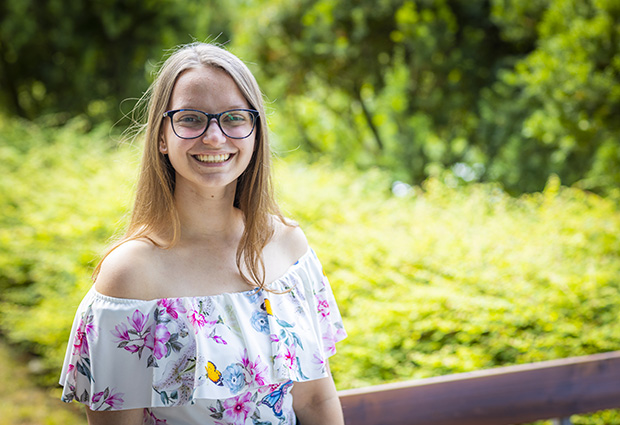
Slovakian teen scientist visits EMBL
Interview with Janka Motešická: a EUCYS 2018 prize winner

Janka Motešická from Vranov nad Topľou in Slovakia was only 16 years old when she started working on her own research project on improving cancer therapies. Two years later, through participation in last year’s EU Contest for Young Scientists (EUCYS) in Dublin, Ireland, she won a specially donated EIROforum prize. It entitled her to visit EMBL Heidelberg, where she attended her first scientific conference, met with staff of different departments and toured the animal and genomics facilities. Here, she explains her motivation for doing research and her views on pursuing a scientific career in Slovakia.
What did you expect when you found out about your prize?
Initially I had no expectations, because I had not heard of EMBL before, which is a shame. However, when I found out more about my prize, I was very excited, because this visit to EMBL combines two things I love: travel and science.
How do you explain your research project to your family and friends?
I would probably say it was about finding new ways to cure cancer. We tried to improve and combine two methods used for treating cancer: photodynamic therapy and chemotherapy. As a model system, we cultured the most aggressive human brain cancer cells. We were able to change the behaviour and lifespan of these specific types of cancer cells and improved the efficiency of photodynamic therapy by 5–20%.
I didn’t enjoy high school very much, because I felt we only learnt theoretical things – things we cannot see or feel – and that frustrated me.
How did you get into doing research?
My high school had a partnership with Pavol Jozef Šafárik University in Košice and I wanted to work there. They asked me to choose a research topic and I signed up. The opportunity was there for everyone in my school, but only four took it. After one year, only two of us had continued. Most of my schoolmates were probably put off by the time commitment and by the long commute. On average, I worked in the lab for five hours after school, three days a week, and I had to travel 1,5 hours to the lab. The train costs €2 each way, and that is a lot of money for some.
What motivated you to continue with your project?
I didn’t enjoy high school very much, because I felt we only learnt theoretical things – things we cannot see or feel – and that frustrated me. Therefore I was glad to do something more applied and interesting after school. I know that in university I will also have to study hard, but I can use that knowledge in my future job.
Was the English you learnt in school enough to understand the scientific literature?
In addition to lessons at school, I’ve also had a private English tutor since I was eight years old. Private tuition is not unusual in Slovakia. It’s important for me to learn English, because I love travelling and want to communicate with people. However, I did not learn scientific English and found it very hard to understand the literature in the beginning. I read my first paper and did not understand a word, so I looked them up one by one. I was very motivated to learn more about my project and also studied the diploma and Bachelor theses of former students.
I don’t know what exactly I’m going to do after university, but I know it will be something special.
What are your next career steps?
For the next six years, I’m planning to study medicine. In parallel, I want to do my PhD in clinical research. Masaryk University in Brno in the Czech Republic offers an additional scientific track to people like me, who’ve already done research in the lab. I have to change fields, but it’s my goal to be able to do clinical trials. In the future, I want to work with people and I want to see the result of my work by helping patients. I think the scientific aspect is very exciting. If you only study medicine and work as a doctor, you will probably have the same routine every day. That is not for me. I don’t know what exactly I’m going to do after university, but I know it will be something special.
What challenges do you see in pursuing your career goals?
In Slovakia it’s hard to do research, because of the economic situation. That is a shame. But there are a lot of great scientists. If we had a little bit more money to do our research, along with better facilities, the research environment would be much better. During this week at EMBL I started thinking about returning to EMBL, e.g. for an internship. It would be great to be able to use the facilities on site and not have to travel to another country to do an experiment.
What will you remember most about your week here at EMBL?
Mostly, I will remember all the great people I’ve met. Everyone was really friendly and open – I would love to stay in touch with all of them. Also, I was surprised how many people from Slovakia and the Czech Republic work here. They organised a Slovak lunch for me, and met me for dinner. The food in the EMBL canteen was excellent and quite different to the food I can eat in my home country.
I would like to thank every scientist for their interesting talks, EMBL staff for their warm welcome, and especially my whole family for their encouragement and love.


